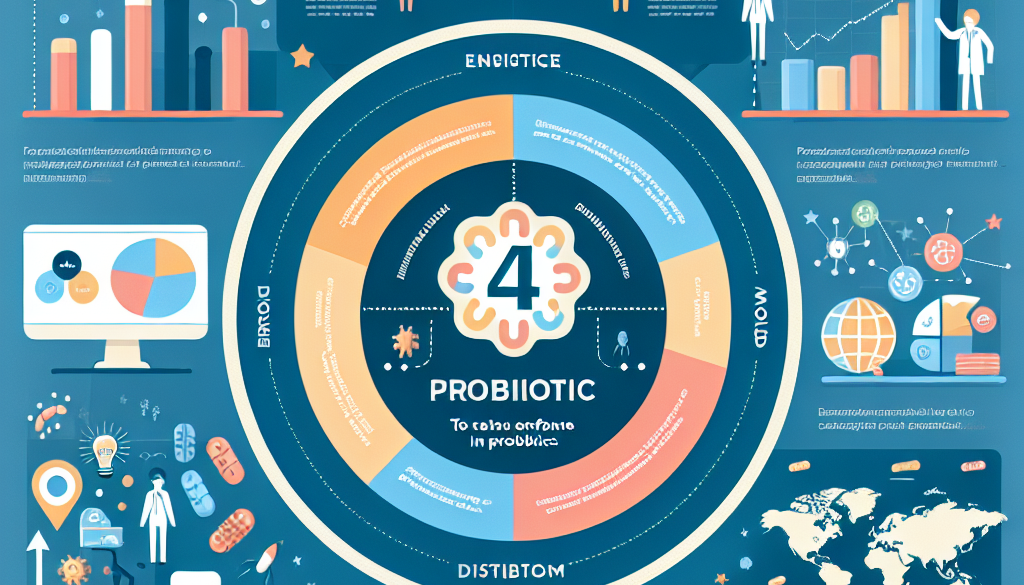4 Insights to Note Before Entering the Probiotic Market
-
Table of Contents
- Probiotic Market Entry: 4 Essential Insights for Success
- 1. Understanding Consumer Demand and Market Trends
- 2. Regulatory Compliance and Quality Assurance
- 3. Innovation and Differentiation
- 4. Strategic Partnerships and Marketing
- Conclusion
- Enhance Your Probiotic Offerings with ETprotein’s High-Quality Protein Products
Probiotic Market Entry: 4 Essential Insights for Success

The probiotic market is a rapidly growing segment within the health and wellness industry, driven by an increasing consumer awareness of the benefits of a healthy gut microbiome. As more companies look to enter this lucrative market, understanding the complexities and trends is crucial for success. Here are four insights to consider before diving into the world of probiotics.
1. Understanding Consumer Demand and Market Trends
Before entering the probiotic market, it’s essential to grasp the current consumer demand and market trends. Consumers are becoming more health-conscious and are looking for natural ways to improve their well-being. This shift has led to a surge in the popularity of probiotics, which are known for their benefits in digestive health, immunity, and even mental health.
- Demographic Focus: Different demographics have varying needs and preferences. For example, probiotics for women’s health, such as those targeting vaginal flora, have gained popularity.
- Delivery Formats: Probiotics come in various forms, including capsules, powders, and fortified foods and beverages. Innovations in delivery methods can set your product apart.
- Strain Specificity: Not all probiotics are the same. Certain strains offer specific health benefits, and consumers are becoming more aware of this. Tailoring products to address particular health concerns can be a significant differentiator.
Case studies of successful probiotic brands reveal that those who invest in consumer education and transparent labeling tend to gain more trust and loyalty from their customers.
2. Regulatory Compliance and Quality Assurance
The probiotic market is subject to various regulations that ensure the safety and efficacy of products. Compliance with these regulations is non-negotiable for market entry.
- Labeling Requirements: Accurate labeling, including strain identification and CFU (colony-forming units) count at the time of expiration, is mandatory in many regions.
- Health Claims: Making health claims on probiotic products is heavily regulated. Companies must ensure that any claims are substantiated by scientific evidence and comply with local regulations.
- Quality Control: Implementing rigorous quality control measures is essential to ensure the viability and potency of probiotic strains from production to shelf-life.
Statistics show that companies that prioritize quality and compliance can better withstand regulatory scrutiny, leading to a stronger market presence.
3. Innovation and Differentiation
In a crowded market, innovation and differentiation are key to standing out. Companies entering the probiotic space must offer unique products or services that meet the evolving needs of consumers.
- Proprietary Strains: Developing or licensing proprietary probiotic strains can provide a competitive edge.
- Combination Products: Combining probiotics with prebiotics (synbiotics) or other health-promoting ingredients can appeal to consumers looking for multifunctional supplements.
- Research and Development: Investing in R&D can lead to breakthroughs in strain stability, allowing for broader applications in non-refrigerated products.
Examples of innovation include the development of spore-forming probiotics that can survive harsher conditions or the creation of personalized probiotic regimens based on individual microbiome analysis.
4. Strategic Partnerships and Marketing
Forming the right partnerships and employing effective marketing strategies are crucial for success in the probiotic market.
- Supply Chain Partnerships: Collaborating with reputable suppliers ensures access to high-quality strains and raw materials.
- Co-Branding Opportunities: Partnering with established brands can enhance credibility and reach a wider audience.
- Digital Marketing: A strong online presence, including social media and content marketing, can educate consumers and build brand loyalty.
Case studies show that companies that leverage influencer partnerships and focus on storytelling around the science of probiotics can achieve higher engagement and conversion rates.
Conclusion
Entering the probiotic market requires a well-rounded strategy that encompasses consumer insights, regulatory compliance, innovation, and strategic marketing. By focusing on these four key areas, companies can position themselves for success in this growing industry. The probiotic market offers significant opportunities, but only to those who are prepared to navigate its complexities with a thoughtful and informed approach.
Enhance Your Probiotic Offerings with ETprotein’s High-Quality Protein Products
For businesses looking to expand their probiotic product line, incorporating high-quality protein can be a game-changer. ETprotein offers a range of organic bulk vegan proteins that can complement probiotic supplements, enhancing their appeal to health-conscious consumers. Their non-GMO, allergen-free proteins, including rice, pea, and various seed proteins, are characterized by a neutral taste and high purity, making them an excellent addition to any probiotic formula.
ETprotein’s commitment to quality and customer service makes them an ideal partner for companies entering the probiotic market. Their expertise in protein manufacturing and supply can provide your business with the competitive edge needed to thrive in this dynamic industry.
About ETprotein:
ETprotein, a reputable protein and L-(+)-Ergothioneine (EGT) Chinese factory manufacturer and supplier, is renowned for producing, stocking, exporting, and delivering the highest quality organic bulk vegan proteins and L-(+)-Ergothioneine. They include Organic rice protein, clear rice protein, pea protein, clear pea protein, watermelon seed protein, pumpkin seed protein, sunflower seed protein, mung bean protein, peanut protein, and L-(+)-Ergothioneine EGT Pharmaceutical grade, L-(+)-Ergothioneine EGT food grade, L-(+)-Ergothioneine EGT cosmetic grade, L-(+)-Ergothioneine EGT reference grade and L-(+)-Ergothioneine EGT standard. Their offerings, characterized by a neutral taste, non-GMO, allergen-free attributes, with L-(+)-Ergothioneine purity over 98%, 99%, cater to a diverse range of industries. They serve nutraceutical, pharmaceutical, cosmeceutical, veterinary, as well as food and beverage finished product distributors, traders, and manufacturers across Europe, USA, Canada, Australia, Thailand, Japan, Korea, Brazil, and Chile, among others.
ETprotein specialization includes exporting and delivering tailor-made protein powder and finished nutritional supplements. Their extensive product range covers sectors like Food and Beverage, Sports Nutrition, Weight Management, Dietary Supplements, Health and Wellness Products, and Infant Formula, ensuring comprehensive solutions to meet all your protein needs.
As a trusted company by leading global food and beverage brands and Fortune 500 companies, ETprotein reinforces China’s reputation in the global arena. For more information or to sample their products, please contact them and email sales(at)ETprotein.com today.














